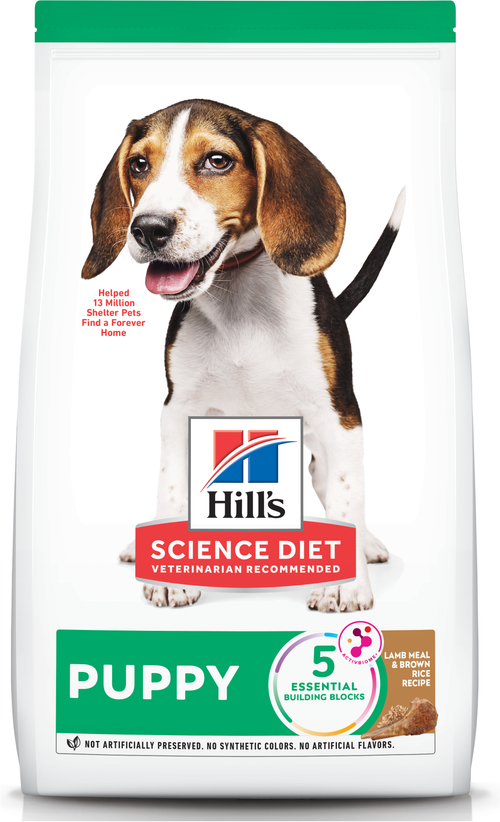
-
Find the right food for your petTake this quiz to see which food may be the best for your furry friend.Find the right food for your petTake this quiz to see which food may be the best for your furry friend.Featured products
 Puppy Lamb Meal & Brown Rice Recipe
Puppy Lamb Meal & Brown Rice RecipeVital nutrients to support 5 essential building blocks for lifelong health
Shop Now Puppy Large Breed Chicken & Brown Rice Recipe
Puppy Large Breed Chicken & Brown Rice RecipeVital nutrients to support 5 essential building blocks for lifelong health
Shop Now Hill's Science Diet Adult 7+ Senior Vitality Small & Mini Chicken & Rice Recipe Dog Food
Hill's Science Diet Adult 7+ Senior Vitality Small & Mini Chicken & Rice Recipe Dog FoodImproves everyday ability to get up & go
Shop NowFeatured products Adult Sensitive Stomach & Skin Cat Food
Adult Sensitive Stomach & Skin Cat FoodHighly digestible food that is gentle on the stomach. Nourishes skin & promotes lustrous fur.
Shop Now Adult 7+ Chicken Recipe Cat Food
Adult 7+ Chicken Recipe Cat FoodSupports energy level and beautiful fur in mature cats
Shop Now Adult Indoor Chicken Recipe Cat Food
Adult Indoor Chicken Recipe Cat FoodSupports energy level and beautiful fur in indoor cats
Shop Now -
Dog
- Dog Tips & Articles
-
Health Category
- Weight
- Food & Environmental Sensitivities
- Urinary
- Digestive
- Joint
- Kidney
-
Life Stage
- Puppy Nutrition
- Adult Nutrition
Cat- Cat Tips & Articles
-
Health Category
- Weight
- Skin & Food Sensitivities
- Urinary
- Digestive
- Kidney
-
Life Stage
- Adult Nutrition
Featured articles Pet Food Storage Tips
Pet Food Storage TipsDiscover how and where to store your dry, as well as canned, dog and cat food. Learn how to find the "best before" dates on all Hill's pet food packaging.
Read More Water
WaterDiscover why water is the most important nutrient for your dog or cat to live a healthy life. Find out how much water your pet should consume each day.
Read More The Incredible Science Behind Your Pet's Microbiome
The Incredible Science Behind Your Pet's MicrobiomeLearn what a pet's microbiome is, how it contributes to your pet's gut & overall health, and why nutrition is important in maintaining healthy microbiomes.
Read More -

Barbara Shannon has fostered dogs for rescue organizations for several years, and she falls for every one of them. But her favorites? The rough-and-tumble puppies.
"They can be a lot of work, but it's so enjoyable to watch them grow and develop into their personalities," says Shannon, who lives in Erie, PA. "It takes a lot of love and time, but it's the best experience."
If you're a first-time foster parent and are wondering if fostering a puppy is for you, know that while it can be challenging, it's sure to be very rewarding experience.

Why Shelters Foster Puppies
Recruiting volunteers to foster dogs in their homes until they can be adopted can help shelters in many ways. Some rescue organizations don't have a physical building to house dogs, while others may be running out of space for all the animals in need in their communities. A foster arrangement can benefit dogs by letting them adjust to living in a family home for the first time or removing them from the stress of living with other animals.
One of the organizations Shannon has fostered puppies for is The Humane Society of Northwest Pennsylvania, located in Erie, PA. Shelter Director Nicole Bawol says the shelter prioritizes fostering pregnant pups and very young animals.
"The shelter can be a loud and stressful environment," Bawol says. "We also have dogs coming and going all the time, which opens up the doors for diseases, and puppies — just like babies — are more susceptible to picking those up."
Bawol says another reason the shelter prioritizes fostering puppies and kittens is the importance of socialization. For instance, the shelter recently received puppies seized from a home in a cruelty investigation. The four-month-old dogs were under-socialized and exhibiting aggressive behaviors, but were able to turn around once they were living in a safe place, she says.
"It's times like that you really see the power of fostering — you can take a very timid pet and put them in a home dynamic and in a matter of weeks they can be thriving," she says.
What to Expect When You're a Foster Puppy Parent
If you want to learn how to foster a puppy, it helps to be a seasoned dog parent who is willing to clean up messes and has a knowledge of basic health conditions to watch out for. Expect to make time in your day for feeding, walks and playtime, and budget more time than you would for activities with your own dog if your temporary pup needs extra behavioral or medical help.
Caring for puppies — especially those that come from difficult backgrounds — can be a time-consuming task. Shannon is retired, so she can be home with the dogs she fosters for most of the day. She most recently fostered a mother dog who came to her with two two-week-old puppies.
"They were healthy, so mostly it was my job to just assist mom the first few weeks however I could," she says. But once the puppies were older and more independent, her house had to be puppy-proofed.
"Puppies will chew on anything," she says. "So it's important to have a safe environment for them."
After seven weeks in her home, the puppies returned to the shelter, where — with the help of social media — families adopted them within hours.
"We generally don't have a difficult time adopting puppies, especially small-breed puppies, out almost immediately," Bawol says.


Tasty Tips
The Cost of Fostering
Most shelters will provide some assistance to foster families. For instance, many shelter organizations will pay for any vet care. Other shelters provide much more. The Erie shelter where Bawol and Shannon work, for instance, provides everything from food and leashes to toys and bedding.
At the minimum, as a foster parent of puppies you should expect:
- A lot of laundry: You should plan to change and wash bedding once a day when you have a mom with puppies, Shannon says.
- A lot of time and work: Even healthy puppies need many hours of time and attention. Sometimes a litter will have a puppy or two in need of special care, like bottle feeding, which can make caring for them even more time-consuming, Bawol says.
- To provide safe spaces: As the puppies get older and more adventurous, you'll want to enclose them for safety reasons when you're either away or otherwise engaged in household activities. This enclosed space could be a designated "puppy room" with a baby gate across the door or some type of large dog playpen.
But most importantly?
"You need a lot of love and time to foster a puppy or dog," Shannon says.

Requirements for Fostering
While each shelter and rescue organization has different protocols in place to approve foster families, most require paperwork and at least a basic background check. Some require much more.
The Humane Society of Northwestern Pennsylvania, for instance, require applicants to fill out forms, go through a background check, and submit to an interview process and a home visit prior to approval.
"Some people think we're overly strict since this is a volunteer job, but we're responsible for the well-being of these pets and we take that seriously," Bawol says.
For Shannon, the time and effort of fostering puppies is worth it — especially when she hears news that the dogs have been adopted.
"Of course it's always hard to say goodbye," she says. "I just have to remind myself I'm just a step on their way to their forever home."
So, if you're interested in fostering puppies or special needs dogs, talk to your local shelter to see if they have a program you can get involved in. The length of time that you foster varies based on the needs of the dogs, and it may be several months before there are dogs that need fostering, so make sure you are always prepared. The joy that fostering dogs can bring is indescribable, and you can enjoy watching these dogs grow as if they were your own dogs.


Kara Murphy is a freelance writer and pet parent who lives in Erie, Pa. She has a goldendoodle named Maddie.
Related products

Vital nutrients to support 5 essential building blocks for lifelong health

Improves everyday ability to get up & go

Vital nutrients to support 5 essential building blocks for lifelong health

Improves Everyday Ability to Get Up & Go
Related articles

Learn basic steps & precautions for treating a cut on your dog, including what you can put on the cut, and when you should take them to the vet.

Learn how to stop your dog from begging at the dinner table, and understand how it can help contribute to his health.

Discover fun and engaging games and other ways to help your dog exercise, keeping him happy and healthy.

Understand the role that Omega-6 and Omega-3 fatty acids play in your dog's overall health, and how you can ensure they are getting enough.

Put your dog on a diet without them knowing
Our low calorie formula helps you control your dog's weight. It's packed with high-quality protein for building lean muscles, and made with purposeful ingredients for a flavorful, nutritious meal. Clinically proven antioxidants, Vitamin C+E, help promote a healthy immune system.
Put your dog on a diet without them knowing
Our low calorie formula helps you control your dog's weight. It's packed with high-quality protein for building lean muscles, and made with purposeful ingredients for a flavorful, nutritious meal. Clinically proven antioxidants, Vitamin C+E, help promote a healthy immune system.

